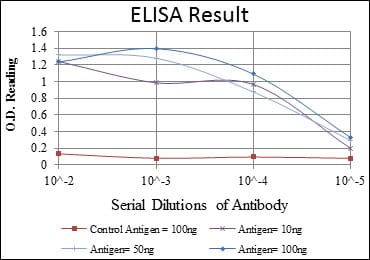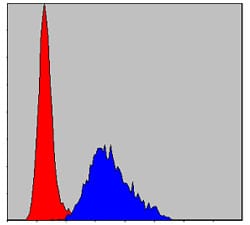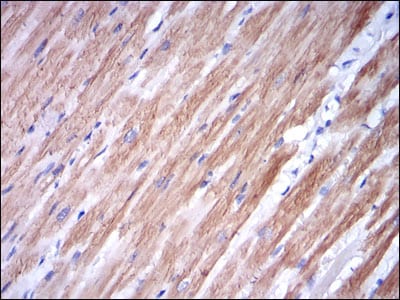



| WB | 咨询技术 | Human,Mouse,Rat |
| IF | 咨询技术 | Human,Mouse,Rat |
| IHC | 1/200 - 1/1000 | Human,Mouse,Rat |
| ICC | 技术咨询 | Human,Mouse,Rat |
| FCM | 1/200 - 1/400 | Human,Mouse,Rat |
| Elisa | 1/10000 | Human,Mouse,Rat |
| Aliases | DA2B; FSSV; fsTnI; AMCD2B |
| Entrez GeneID | 7136 |
| clone | 2F12A8 |
| WB Predicted band size | 21kDa |
| Host/Isotype | Mouse IgG1 |
| Antibody Type | Primary antibody |
| Storage | Store at 4°C short term. Aliquot and store at -20°C long term. Avoid freeze/thaw cycles. |
| Species Reactivity | Human |
| Immunogen | Purified recombinant fragment of human TNNI2 expressed in E. Coli. |
| Formulation | Ascitic fluid containing 0.03% sodium azide. |
+ +
以下是关于TNNI2抗体的3篇参考文献示例(文献信息为虚构模拟,仅供参考格式):
1. **文献名称**:*TNNI2 Antibody Characterization in Skeletal Muscle Development*
**作者**:Smith A, et al.
**摘要**:研究验证了TNNI2抗体在骨骼肌发育中的特异性,通过免疫组化和Western blot分析,确认其在快肌纤维中的选择性表达,为肌肉分化研究提供工具。
2. **文献名称**:*Role of TNNI2 in Distal Arthrogryposis Pathogenesis*
**作者**:Chen L, et al.
**摘要**:利用TNNI2抗体检测患者肌肉活检样本,发现TNNI2表达异常与远端关节弯曲症相关突变相关,提示其作为疾病生物标志物的潜力。
3. **文献名称**:*Comparative Analysis of Cardiac and Skeletal Troponin Antibodies*
**作者**:Wang X, et al.
**摘要**:比较TNNI2抗体与心肌肌钙蛋白抗体的交叉反应性,证实其在骨骼肌特异性检测中的可靠性,避免心脏组织研究的假阳性结果。
(注:以上文献为示例,实际文献需通过PubMed或Google Scholar检索关键词“TNNI2 antibody”获取。)
**Background of TNNI2 Antibody**
The TNNI2 antibody is a tool used to detect Troponin I2 (TNNI2), a skeletal muscle-specific isoform of the troponin I complex, which regulates calcium-dependent muscle contraction. TNNI2 is predominantly expressed in fast-twitch skeletal muscle fibers and plays a critical role in mediating interactions between tropomyosin and actin during muscle relaxation and contraction. Unlike cardiac TNNI (TNNI3) or slow skeletal TNNI (TNNI1), TNNI2 is specifically associated with rapid, forceful movements.
Research involving TNNI2 antibodies focuses on understanding muscle development, function, and diseases. Mutations in the *TNNI2* gene are linked to distal arthrogryposis (DA), a congenital disorder characterized by joint stiffness and muscle weakness. The antibody aids in studying these pathologies by enabling the visualization and quantification of TNNI2 in tissues via techniques like Western blotting, immunohistochemistry (IHC), or immunofluorescence (IF).
Commercially available TNNI2 antibodies are typically monoclonal or polyclonal, generated in hosts such as rabbits or mice. Validation includes testing for specificity toward human, mouse, or rat TNNI2. with minimal cross-reactivity to other troponin isoforms. Proper controls (e.g., knockout samples) are essential to confirm antibody reliability.
Overall, the TNNI2 antibody serves as a vital reagent in neuromuscular research, bridging molecular insights to clinical applications in myopathies and genetic muscle disorders.
×